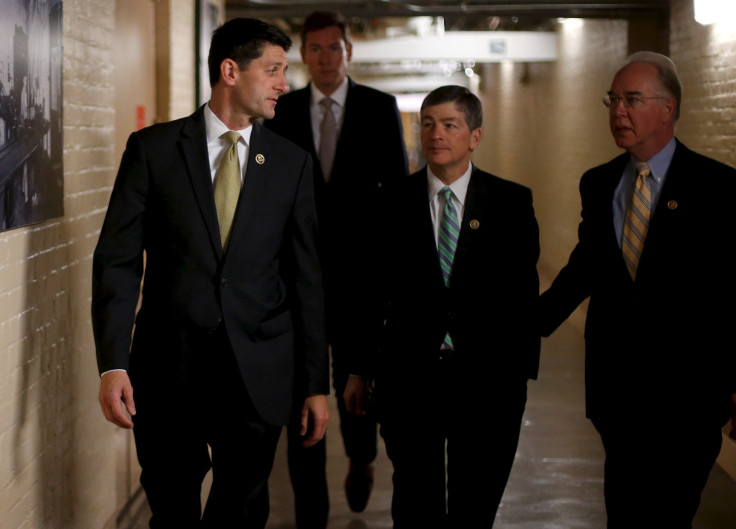House Takes Aim At Federal Reserve And Financial Watchdog Agency In Advance Of Year-End Blitz

The Consumer Financial Protection Bureau (CFPB) and the Federal Reserve each found themselves in the crosshairs of the House of Representatives this week, as Republicans passed bills that would limit the independence of each agency and curtail some regulatory powers.
Overshadowed by the afternoon passage of a bill seeking to pause the resettlement of Syrian refugees in the U.S., the two bills would impose changes sharply opposed by President Barack Obama and Democratic officials.
Though both pieces of legislation have slim chances of becoming law, they serve as previews for year-end must-pass bills that congressional Democrats worry will contain unpalatable provisions rolling back financial regulations -- and risk a government shutdown.
Fed Up
On Thursday, the House passed the Fed Oversight Reform and Modernization Act, or FORM Act, which would require the Federal Reserve to devise a mathematical formula to dictate interest rates and other aspects of monetary policy. The bill passed 241-185 with strong GOP support.
Fed Chair Janet Yellen said changing Fed policy would “severely impair the Federal Reserve’s ability to carry out its congressional mandate and would be a grave mistake, detrimental to the economy and the American people.” The White House threatened a veto.
But politicians from both sides of the aisle have recently made populist appeals surrounding the Fed. Republican presidential hopeful Sen. Ted Cruz of Texas called Fed officials "philosopher-kings" in the most recent GOP debate, blaming the bank for a nonexistent inflation problem.
On the Democratic side, Rep. Alan Grayson of Florida added an amendment to the FORM Act requiring an annual audit of the Fed, calling it “a simple change that would ensure that Congress, and the American people, will know, once and for all, what the Fed is doing with our money.”
House Majority Leader Paul Ryan sounded a similar note. “If the Federal Reserve explained to the public how it made its decisions, the American people would have greater confidence in them,” Ryan said in a statement.
The Fed, which has guarded its relatively nonpartisan decision-making process, releases voluminous notes after each interest rate-setting meeting. The minutes give an in-depth account of how the Fed views the economy and the reasoning behind policy decisions.
Car Troubles
The FORM Act followed the Wednesday passage of a bill that would limit the CFPB’s ability to enforce guidelines intended to prevent racial discrimination amongst auto lenders. The bill enjoyed far wider support in the House, passing 332-96.
Civil rights groups lined up in opposition, calling the legislation “a vote to condone discrimination in the auto lending market.” The bill would forbid the CFPB from enforcing rules that mandate auto lenders to disallow dealerships from adjusting loans on a case-by-case basis -- which the agency argues allows for discrimination.
The CFPB has no authority over dealerships, but the agency was able to pressure lenders to keep dealers from charging higher rates to some customers. In September, the CFPB took action against Fifth Third Bank for alleged discrimination, saying that Latino and African-American borrowers were hit with interest-rate markups, made regardless of creditworthiness, which costed them $200 more than white borrowers.
But the process for returning penalties to harmed borrowers created controversy. Without a comprehensive database with affected borrowers’ race, the agency has used an algorithm that estimated race based on surname and zipcode. House Financial Services Committee Chairman Jeb Hensarling, R-Tex., called the process “junk science.”
The House bill, titled Reforming CFPB Indirect Auto Financing Guidance Act, would nullify the CFPB’s guidance. The White House has said it “strongly oppose[d]” the passage of the bill, which it said would “create confusion about the existing protections in place to prevent discriminatory auto loan pricing.”
The bill passed as congressional Republicans are reportedly mulling the insertion of riders in must-pass budget bills that would further hamper the independence of the CFPB, an agency that has faced GOP resistance since it was formed in 2011. With Democrats including Elizabeth Warren of Massachusetts pledging to block any rollbacks of financial reforms in the 2010 Dodd-Frank Act, the stage is set for another government shutdown drama.
© Copyright IBTimes 2024. All rights reserved.












